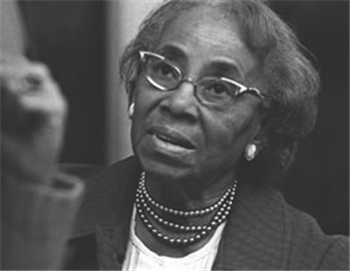

Septima Poinsette Clark (May 3, 1898–December 15, 1987) was an American educator and civil rights activist. Clark developed the literacy and citizenship workshops that played an important role in the drive for voting rights and civil rights for African Americans in the American Civil Rights Movement. She became known as the “Queen mother” or “Grandmother” of the American Civil Rights Movement in the United States. Martin Luther King, Jr. commonly referred to Clark as “The Mother of the Movement.”
In 1916, Poinsette received her teaching certificate from Avery Normal Institute in Charleston. Black teachers were barred from teaching in Charleston, so her first three years were on the staff at John’s Island, South Carolina. There she attempted to institute adult literacy classes, through the NAACP, to address some of the educational inequities at John’s Island. In 1919, Poinsette returned to Avery Institute, spearheading a campaign against Charleston’s exclusionary policies, overturning that law one year later.
In 1920, she married Nerie Clark, a black Navy cook with whom she had two children; Clark’s mother raised one, and the other died at birth. Shortly thereafter she became involved in various civic organizations and continued her education in Columbia. Carrying on the fight for Black teachers throughout the state, Clark received her BA from Benedict College in 1942 and her MA from Hampton Institute in 1945.
Although her activist efforts with the NAACP helped initiate equal pay ruling in that year, she was fired from teaching in Charleston in 1947 because she was a member of the NAACP. Unable to find work Clark relocated to Monteagle, TN, teaching adult education at the Highlander Folk School, where she formed an adult literacy program with another woman, teaching people how to fill out drivers’ license and voter registration forms, and how to sign checks. Guided by her belief that education and Black equality were integral subjects, when she became director Clark devised a curriculum that focused on promoting voter registration and empowering people to solve their issues through social activism. One of her students was Rosa Parks, who helped start the Montgomery Bus boycott.
This was capped with her founding of the first “Citizenship School,” created successfully on John’s Island in 1957. With links to Highlander Folk School constantly being disrupted by the Tennessee legislature and finally resulting in the revocation of its charter, in 1961 the citizenship program was transferred to the Southern Christian Leadership Conference (SCLS). By 1970, over 800 citizenship schools, graduated over 100,00 African-Americans. They in turn served as an essential grass-roots base for the civil rights movement throughout the Deep South.
Her autobiography, “Echo in My Soul,” was published in 1962. She was keynote speaker at the first convention of the National Organization of Women (NOW), speaking on “The Need of Women Challenging Male Dominance.” Septima P. Clark received many awards from many sources. She was given the American Book Award for her second biography, “Ready from Within: Septima Clark and the Civil Rights Movement,” in 1987. She died later that year in Charleston.
